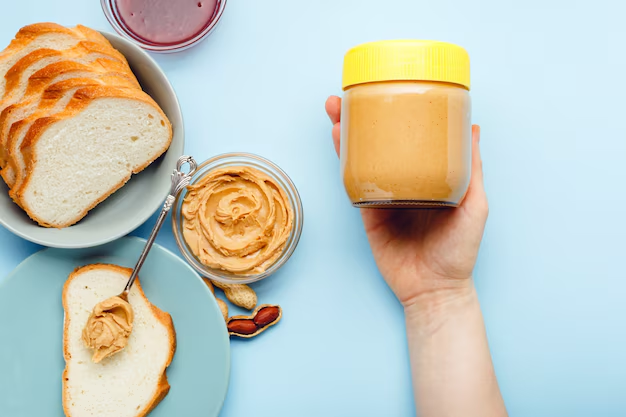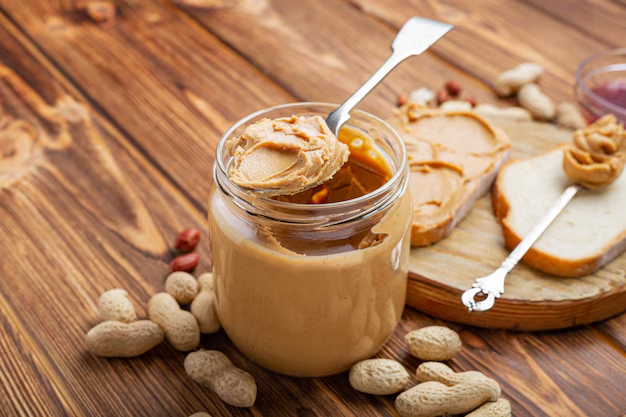Peanut butter is one of the most popular and versatile foods worldwide. It’s creamy, delicious, and loaded with nutrients. But if you’re watching your carbohydrate intake, you might wonder, is peanut butter low in carbs? This article delves into its nutritional profile, explores its compatibility with low-carb and keto diets, and examines specific use cases. Let’s find out whether this pantry staple can fit into your health goals.
Nutritional Overview of Peanut Butter
Peanut butter is not just a tasty treat; it’s packed with macronutrients like carbs, fats, and proteins. Understanding its nutritional makeup is crucial for determining its role in your diet.
Carbohydrates in Peanut Butter
Peanut butter contains a moderate amount of carbohydrates. On average, one tablespoon (about 16 grams) of peanut butter has roughly 3–4 grams of carbs. This makes it relatively low-carb compared to other spreads like jelly or chocolate spreads.
But are peanuts themselves carbohydrates or protein? The answer lies in their composition. Peanuts, the base ingredient of peanut butter, are a legume. They contain primarily fats and proteins with a small portion of carbs. About 100 grams of peanuts contain 16 grams of carbs, which is why they are classified as a low-carb food.
Fats and Proteins in Peanut Butter
Peanut butter is rich in healthy fats. These include monounsaturated and polyunsaturated fats, which are heart-healthy and provide sustained energy. One tablespoon contains about 8 grams of fat.
In terms of protein, peanut butter is a great source. A single tablespoon delivers approximately 4 grams of protein, making it an excellent option for building and repairing muscles. These factors combined make peanut butter a nutrient-dense choice for many diets.
Peanut Butter and Low-Carb Diets
Low-carb diets focus on limiting carbohydrates while increasing fats and proteins. Let’s see if peanut butter fits into this framework.
Is Peanut Butter Good for Low-Carb Diets?
Yes, peanut butter can be a great addition to low-carb diets. Its low carbohydrate content and high fat profile align well with these dietary principles. However, moderation is key. Overeating peanut butter can still contribute to carb intake, especially if the brand contains added sugars.
Is Peanut Butter Low in Carbs and Sugar?
Most natural peanut butter are low in both carbs and sugar. Look for varieties with no added sugar, as some commercial brands sneak in sweeteners. For example, one tablespoon of natural peanut butter may contain 2–3 grams of carbs and less than 1 gram of sugar. In contrast, sweetened versions may have double the carbs.
Is Peanut Butter Carb-Friendly?
Peanut butter is considered carb-friendly, but not all products are created equal. Always read the label to avoid hidden carbs from added ingredients. The simpler the ingredient list, the better.
Keto Diet and Peanut Butter

The ketogenic diet requires a very low intake of carbs, typically under 50 grams per day. Can peanut butter fit within these strict guidelines? Let’s dive in.
How to Eat Peanut Butter on Keto?
Peanut butter can be enjoyed on keto in moderation. Stick to unsweetened, natural peanut butter, as it typically has fewer carbs. Pair it with keto-friendly foods like celery, cucumber slices, or almond flour crackers. Another option is to use it in keto recipes like fat bombs or smoothies.
Why No Peanuts on Keto?
You might have heard that peanuts are not ideal for keto. This is because peanuts are technically legumes, not nuts. Legumes are higher in carbs compared to true nuts like almonds or walnuts. However, in small amounts, peanuts and peanut butter can still fit into a keto plan without disrupting ketosis.
Is Skippy Peanut Butter Keto?
Skippy peanut butter is a popular brand, but most varieties contain added sugars and hydrogenated oils. This makes them less suitable for keto. If you’re following a ketogenic diet, avoid Skippy and similar brands. Opt for natural alternatives instead.
Best Peanut Butter for Keto
The best peanut butter for keto should be unsweetened, with minimal ingredients. Brands like Crazy Richard’s, Smucker’s Natural, and 365 by Whole Foods are excellent choices. They typically contain just peanuts and a pinch of salt, keeping the carb count as low as possible.
Specific Use Cases
Peanut butter isn’t just a snack; it serves various roles in health and nutrition. Let’s explore its benefits in two specific scenarios.
Is Peanut Butter Good in Early Pregnancy?
Yes, peanut butter is beneficial during early pregnancy. It provides essential nutrients like protein, healthy fats, and folate, which support fetal development. Folate is particularly crucial as it helps prevent neural tube defects.
Peanut butter is also an excellent source of vitamin E, magnesium, and potassium, all of which are important for a healthy pregnancy. Additionally, its high caloric density can help combat fatigue, a common symptom in early pregnancy.
Cautions
While peanut butter is generally safe, some individuals might have a peanut allergy. Pregnant women should also avoid peanut butters with added sugars or hydrogenated oils, as these can negatively impact health.
Can We Eat Peanut Butter in a Diet?
Absolutely! Peanut butter fits well into many diets, whether for weight loss, muscle building, or general health.
Health Benefits of Peanut Butter
The peanut butter health benefits are mentioned below:
- Weight Management: The protein and healthy fats in peanut butter promote satiety, reducing overall calorie intake.
- Energy Boost: Peanut butter’s calorie density makes it a quick energy source for workouts or long days.
- Heart Health: Monounsaturated fats in peanut butter support cardiovascular health.
Tips for Incorporating Peanut Butter
- Use it as a topping for oatmeal or smoothies.
- Spread it on apple slices for a balanced snack.
- Add it to sauces or dressings for a creamy texture.
Choosing the Right Peanut Butter
Peanut butter is a favorite among health enthusiasts and food lovers alike. It’s creamy, delicious, and packed with nutrients. But when you’re on a low-carb diet, finding the right peanut butter can feel tricky. This guide will help you navigate your options, focusing on the lowest-carb peanut butter choices.
Read: Is Peanut Butter Acidic?
What’s the Lowest Carb Peanut Butter?
The carb content in peanut butter varies widely depending on the brand and ingredients. Peanut butter made with just peanuts and a little salt is typically the best choice. These products have fewer carbs than those with added sugars, oils, and flavorings.
Here’s what to look for when shopping for peanut butter:
- Ingredients: Stick to peanut butter made with 100% peanuts or peanuts and salt. Avoid added sugar and oils.
- Net Carbs: Check the label for net carbs, which is calculated as total carbs minus fiber. Aim for peanut butter with 3g net carbs or less per serving.
- Serving Size: A typical serving is 2 tablespoons, so compare carb counts based on this standard.
Some popular low-carb peanut butter brands include:
- Smucker’s Natural Peanut Butter (2g net carbs per serving)
- Crazy Richard’s Peanut Butter (2g net carbs per serving)
- Teddie All Natural Peanut Butter (3g net carbs per serving)
These brands offer minimal processing and no added sugars, making them ideal for low-carb diets.
Comparing Popular Brands for Carb and Sugar Content

Different brands cater to varying preferences, but not all are low-carb friendly. Here’s a comparison of popular peanut butter brands based on carb and sugar content:
| Brand | Net Carbs (Per 2 Tbsp) | Sugar Content (g) | Notes |
| Smucker’s Natural | 2g | 1g | Great natural option, no additives |
| Jif Creamy | 6g | 3g | Contains added sugar and oils |
| Skippy Natural | 4g | 2g | Slightly higher in carbs |
| Justin’s Classic | 4g | 2g | Organic but more carbs |
| Crazy Richard’s | 2g | 0g | 100% peanuts, great low-carb pick |
Choosing the right brand makes a big difference. Always read labels carefully. A small difference in sugar content can quickly add up.
Peanut Butter and Calories
Peanut butter is high in calories, which might surprise some people. A typical serving of 2 tablespoons contains around 190–210 calories. Most of these come from healthy fats and protein. But why is peanut butter so calorie-dense?
- Fat Content: Peanuts are naturally rich in fats, contributing to the high calorie count.
- Concentrated Nutrition: The processing of peanuts into peanut butter doesn’t dilute its calorie content. It remains as nutrient-packed as whole peanuts.
Balancing Calories on a Low-Carb Diet
Calories matter, even on a low-carb diet. Peanut butter can fit into your meal plan, but portion control is key. Here’s how to keep it balanced:
- Use Measuring Spoons: Stick to the recommended serving size of 2 tablespoons.
- Pair with Low-Carb Foods: Combine peanut butter with celery sticks, cucumber slices, or a small apple for a balanced snack.
- Limit Daily Intake: Aim for 1–2 servings per day to avoid overloading on calories.
By managing your portions, you can enjoy peanut butter without compromising your calorie goals.
Low-Carb Nuts as Alternatives
If you’re looking for variety, low-carb nuts are excellent alternatives to peanut butter. They provide healthy fats, protein, and fewer carbs.
Comparison of Nuts and Peanut Butter
| Food | Net Carbs (per 1 Oz) | Calories | Description |
| Almond Butter | 3 g | 190 | Smooth, mild flavor, fewer carbs than peanut butter |
| Walnut Butter | 2 g | 200 | High in omega-3 fats |
| Pecans | 1 g | 200 | Excellent for very low-carb diets |
| Peanuts | 4 g | 160 | Slightly higher in carbs but affordable |
Alternating between peanut butter and other low-carb nuts can keep your diet interesting. Almond butter, for instance, is a fantastic choice for those who want a lighter flavor and fewer carbs.
FAQs
1. Is peanut butter good for a low-carb diet?
Yes, peanut butter can be good for a low-carb diet, especially natural peanut butter. It’s low in carbs and high in healthy fats, making it a great choice in moderation. Watch out for added sugars in processed varieties, as they can increase carbohydrate content.
2. How many carbs are in natural peanut butter?
Natural peanut butter typically contains about 4-7 grams of carbs per 2-tablespoon serving, with 2-3 grams being dietary fiber. Always check the label, as some brands vary slightly depending on added ingredients or the processing method.
3. Can I eat peanut butter every day?
Yes, you can eat peanut butter daily if consumed in moderation. Stick to 1-2 tablespoons to avoid excessive calorie intake. It provides protein, healthy fats, and essential nutrients. Balance it with other foods to meet your dietary goals.
4. What are the best low-carb alternatives to peanut butter?
Low-carb alternatives include almond butter, macadamia nut butter, sunflower seed butter, and tahini. These options are similarly nutrient-dense but may offer lower carbs or different flavor profiles, catering to various dietary preferences.
5. How do I pick the healthiest peanut butter?
Choose natural peanut butter with only peanuts and salt as ingredients. Avoid added sugars, hydrogenated oils, or unnecessary additives. Opt for organic or minimally processed options when possible for better nutritional quality.
Conclusion
Peanut butter can be part of a healthy, low-carb lifestyle. Choosing the right brand with minimal added sugar is key. Brands like Smucker’s Natural and Crazy Richard’s are excellent options for low-carb dieters. Remember to monitor your portions to avoid excess calories.
If you’re seeking variety, low-carb nuts like almonds and walnuts are fantastic alternatives. They provide similar nutritional benefits with unique flavors. By making mindful choices, you can enjoy peanut butter while staying on track with your health goals.

